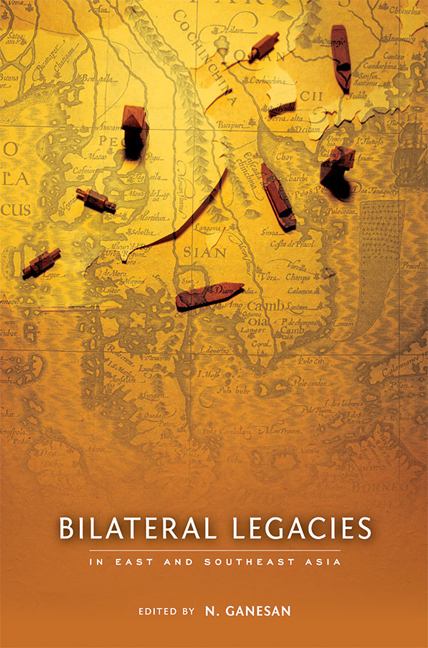Book contents
- Frontmatter
- Contents
- Acknowledgements
- About the Contributors
- 1 Historical Legacies in East and Southeast Asian International Relations
- 2 Historical Overhang or Legacy is What States Make of It: The Role of Realism and Morality in Korea–Japan Relations
- 3 The History Conundrum in Japan's Relations with China
- 4 China–Vietnam Bilateral Overhang or Legacy
- 5 Legacy or Overhang: Historical Memory in Myanmar–Thai Relations
- 6 Glorifying the Inglorious Past: Historical Overhangs or Legacies in Thai–Cambodian Relations
- 7 Comparing Bilateral Overhangs or Legacies in East Asia
- Bibliography
- Index
3 - The History Conundrum in Japan's Relations with China
Published online by Cambridge University Press: 19 May 2017
- Frontmatter
- Contents
- Acknowledgements
- About the Contributors
- 1 Historical Legacies in East and Southeast Asian International Relations
- 2 Historical Overhang or Legacy is What States Make of It: The Role of Realism and Morality in Korea–Japan Relations
- 3 The History Conundrum in Japan's Relations with China
- 4 China–Vietnam Bilateral Overhang or Legacy
- 5 Legacy or Overhang: Historical Memory in Myanmar–Thai Relations
- 6 Glorifying the Inglorious Past: Historical Overhangs or Legacies in Thai–Cambodian Relations
- 7 Comparing Bilateral Overhangs or Legacies in East Asia
- Bibliography
- Index
Summary
Bedevilling Sino–Japanese relations into the twenty-first century, the history issue raises many questions, but no simple solution is in sight. Why have China and Japan not buried the hatchet like France and Germany, but continue to carry their burden of history even though the two Northeast Asian powers are emerging as among each other's best trading partners? Why are the many “apologies” Japan has made over its invasion of China between 1931 and 1945 deemed insufficiently “sincere” by many Chinese? Why did Prime Ministers Koizumi Junichiro and Abe Shinzo insist on visiting the Yasukuni Shrine (the symbol of Japanese militarism to many Chinese and Koreans) even though such visits were repugnant to his Northeast Asian neighbours and plunged bilateral relations to its nadir?
Undoubtedly, antagonism over competing interpretations of history between the two neighbours continues to dampen their bilateral ties. But one must not take a reductionist view of Sino–Japanese relations and perceive them through the prism of historical contention. Indeed, why were historical disputes not a constant irritant or catalyst to a permanent crisis in Sino–Japanese relations throughout much of the post-war period? Why did the history issue surface only sporadically to ruffle post-war bilateral ties before the advent of the Koizumi administration? And why is history a matter of bilateral dispute during the second and not the first Abe administration? Why was the history issue between Beijing and Tokyo swept under the carpet for the most part of the Cold War era? Are there other issues which supersede the history problem in bilateral relations?
For analytical purposes, we can focus on the history issue, but Sino–Japanese ties are complex and multifaceted and in reality this is just one among many problems, and not necessarily always the most significant one to dog bilateral ties. Other challenges for China and Japan include territorial disputes in the East China Sea, especially over the Japanese-administered Senkaku (Diaoyu) islands; the structural shift in East Asia (the rise of China coupled with the relative decline of Japan) and its implications for international relations; and Tokyo's alliance with Washington, which obliges the former to provide logistical support to its U.S. ally in the event of a crisis in the Taiwan Straits or Korean Peninsula — much to the chagrin of Beijing.
Information
- Type
- Chapter
- Information
- Bilateral Legacies in East and Southeast Asia , pp. 55 - 75Publisher: ISEAS–Yusof Ishak InstitutePrint publication year: 2015
